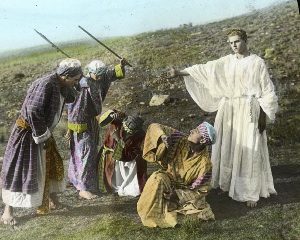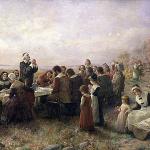
(Wikimedia Commons)
Today’s reading, 2 Nephi 26, is a parade example of the clarity and plainness with which Nephi had promised to prophesy, for it is, indeed, very plain. It outlines much of what will be unfolded, in terms of historical events, over the remainder of the Book of Mormon.
Three passages stand out for me today:
1.
He commandeth that there shall be no priestcrafts; for, behold, priestcrafts are that men preach and set themselves up for a light unto the world, that they may get gain and praise of the world; but they seek not the welfare of Zion. (verse 29)
Latter-day Saints have no paid clergy. A few who’ve been called out of their ordinary lives in order to serve full-time in the Church receive stipends, but there aren’t very many of these. The bishops and stake presidents and the counselors to them who administer the day-to-day affairs of the Church in its local congregations are uncompensated, as are the army of teachers and choir directors and organists and youth leaders and Scoutmasters and others who carry out its mission.
We have sometimes concluded from this, quite illegitimately, that clergymen and -women of other faiths are guilty of what Nephi calls “priestcraft” because they’re paid. But surely his condemnation doesn’t refer to those who sincerely try to serve, to counsel, and to comfort — often, yes, in salaried positions but, almost as often, on meager salaries that don’t really match the amount of training and effort that have gone into their service.
Nephi is quite clear about what, in his view, constitutes the sin of priestcraft: “priestcrafts are that men preach and set themselves up for a light unto the world, that they may get gain and praise of the world; but they seek not the welfare of Zion.”
In other words, the motivation is all-important. Those guilty of priestcraft are self-aggrandizing. They want either money or prestige. Service to God, his kingdom, and his people is far down on their list of priorities, if it makes the list at all.
It seems obvious to me that Latter-day Saints, too, can be guilty of priestcraft. Not for money. That’s not available in our church. But any fireside or sacrament meeting speaker, any Sunday school teacher, who cares most about being complimented and highly regarded rather than about perfecting the Saints and proclaiming the Gospel, about saying what the Lord would have him or her say, is flirting dangerously with the sin of priestcraft. And, as somebody who does a lot of teaching and public speaking and who sometimes even receives compliments on it, I can promise that the temptation is always there at hand. As Elder Maxwell once said, “Never inhale.”
2.
. . . and he inviteth them all to come unto him and partake of his goodness; and he denieth none that come unto him, black and white, bond and free, male and female; and he remembereth the heathen; and all are alike unto God, both Jew and Gentile. (verse 33b)
More and more, as the Church has emerged from its Great Basin refuge and gone around the world — and, most particularly, in the years since the great revelation on priesthood of 1978 — we’re seeing how true this is. I’ve been delighted (for example, in Laie, Hawaii, and Hamilton, New Zealand) to be surrounded by Asian and Polynesian faces as I’ve participated in temple worship. And ground was broken for a new temple in the Democratic Republic of the Congo just a day or two ago. Ever increasingly, ever more visibly and obviously, the Kingdom is multiethnic and diverse.
3.
Hath he commanded any that they should not partake of his salvation? Behold I say unto you, Nay; but he hath given it free for all men; and he hath commanded his people that they should persuade all men to repentance. Behold, hath the Lord commanded any that they should not partake of his goodness? Behold I say unto you, Nay; but all men are privileged the one like unto the other, and none are forbidden. (verses 27-28)
The Calvinist doctrine of “limited atonement,” in the sense that the atonement of Christ was never intended to apply to all, but only to those who were elected before the foundation of the world, is false.
The Bible itself should already have shown this beyond dispute when Paul wrote, in 1 Timothy 2:4, that God “will have all men to be saved, and to come unto the knowledge of the truth.”
But, in such passages as 2 Nephi 26:27-28, the Lord makes it absolutely clear.












